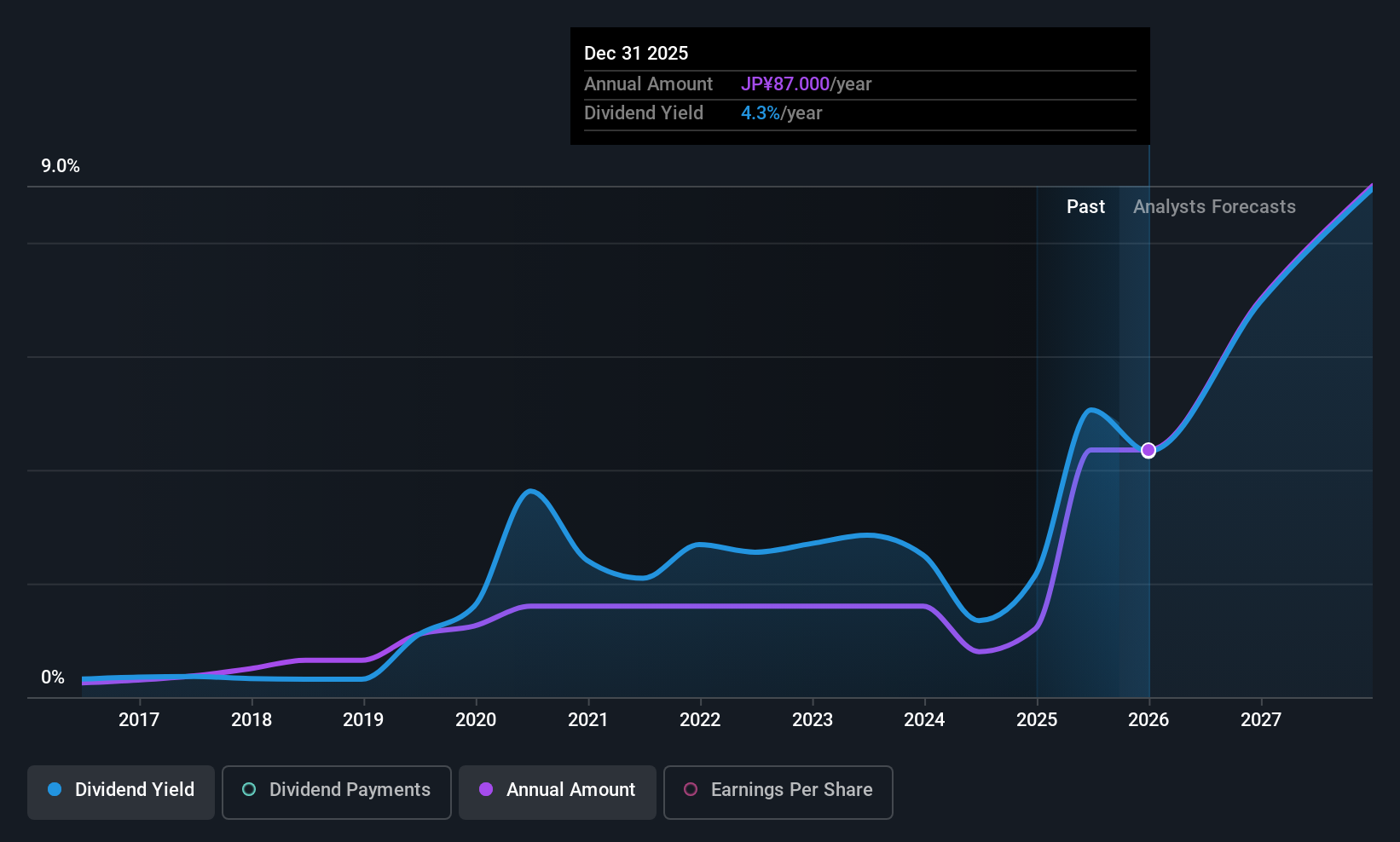Japan Investment Adviser Co., Ltd.’s (TSE:7172) dividend will be increasing from last year’s payment of the same period to ¥44.00 on 27th of March. This makes the dividend yield 4.4%, which is above the industry average.
Trump has pledged to “unleash” American oil and gas and these 15 US stocks have developments that are poised to benefit.
Japan Investment Adviser’s Payment Could Potentially Have Solid Earnings Coverage
We like to see robust dividend yields, but that doesn’t matter if the payment isn’t sustainable. The last dividend was quite comfortably covered by Japan Investment Adviser’s earnings, but it was a bit tighter on the cash flow front. The business is earning enough to make the dividend feasible, but the cash payout ratio of 86% indicates it is more focused on returning cash to shareholders than growing the business.
Over the next year, EPS is forecast to expand by 39.0%. If the dividend continues along recent trends, we estimate the payout ratio will be 52%, which is in the range that makes us comfortable with the sustainability of the dividend.
 TSE:7172 Historic Dividend September 28th 2025
TSE:7172 Historic Dividend September 28th 2025
View our latest analysis for Japan Investment Adviser
Japan Investment Adviser’s Dividend Has Lacked Consistency
Even in its relatively short history, the company has reduced the dividend at least once. This suggests that the dividend might not be the most reliable. Since 2016, the annual payment back then was ¥5.00, compared to the most recent full-year payment of ¥88.00. This implies that the company grew its distributions at a yearly rate of about 38% over that duration. It is great to see strong growth in the dividend payments, but cuts are concerning as it may indicate the payout policy is too ambitious.
Dividend Growth May Be Hard To Come By
With a relatively unstable dividend, it’s even more important to see if earnings per share is growing. Japan Investment Adviser has seen earnings per share falling at 5.3% per year over the last five years. If earnings continue declining, the company may have to make the difficult choice of reducing the dividend or even stopping it completely – the opposite of dividend growth. Earnings are predicted to grow over the next year, but we would remain cautious until a track record of earnings growth is established.
In Summary
Overall, we always like to see the dividend being raised, but we don’t think Japan Investment Adviser will make a great income stock. The low payout ratio is a redeeming feature, but generally we are not too happy with the payments Japan Investment Adviser has been making. We would probably look elsewhere for an income investment.
Companies possessing a stable dividend policy will likely enjoy greater investor interest than those suffering from a more inconsistent approach. However, there are other things to consider for investors when analysing stock performance. Case in point: We’ve spotted 2 warning signs for Japan Investment Adviser (of which 1 makes us a bit uncomfortable!) you should know about. Is Japan Investment Adviser not quite the opportunity you were looking for? Why not check out our selection of top dividend stocks.
New: Manage All Your Stock Portfolios in One Place
We’ve created the ultimate portfolio companion for stock investors, and it’s free.
• Connect an unlimited number of Portfolios and see your total in one currency
• Be alerted to new Warning Signs or Risks via email or mobile
• Track the Fair Value of your stocks
Try a Demo Portfolio for Free
Have feedback on this article? Concerned about the content? Get in touch with us directly. Alternatively, email editorial-team (at) simplywallst.com.
This article by Simply Wall St is general in nature. We provide commentary based on historical data and analyst forecasts only using an unbiased methodology and our articles are not intended to be financial advice. It does not constitute a recommendation to buy or sell any stock, and does not take account of your objectives, or your financial situation. We aim to bring you long-term focused analysis driven by fundamental data. Note that our analysis may not factor in the latest price-sensitive company announcements or qualitative material. Simply Wall St has no position in any stocks mentioned.


AloJapan.com